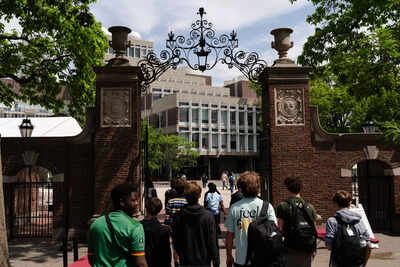
FILE -- A tour group at the Harvard University campus in Cambridge, Mass., May 30, 2025. Harvard cultivated ties with China as a way to partly help bolster its finances. (Sophie Park/The New York Times)
In the quiet corridors of America’s oldest university, the weight of centuries rests easily on ivy-covered stone. But lately, amid the whispers of scholarship and the rustle of library pages, another kind of conversation echoes—one filled with suspicion, oversight, and political tension.
It’s not the curriculum that’s under question, but the company the institution keeps.Harvard University, once revered without hesitation as a cathedral of global intellect, now finds itself walking a geopolitical tightrope. At the center of the controversy is its long and layered relationship with China—a partnership born in the spirit of academic diplomacy, but now shadowed by the specter of national security.
A relationship decades in the making
The entanglement didn’t happen overnight. For decades, Harvard had cultivated academic ties with Chinese universities, welcomed hundreds of students and researchers from China, and even benefited from significant philanthropic contributions originating across the Pacific. These were, for many years, seen as the hallmarks of a forward-looking institution committed to global collaboration.But times have changed.
What once symbolized scholarly progress is now increasingly framed as a potential compromise. As tensions between Washington and Beijing sharpen over trade, technology, human rights, and influence—the optics of American universities accepting Chinese donations and partnerships have shifted from neutral to controversial.
The gift that raised eyebrows
Behind closed doors in government buildings, murmurs began to surface. Officials raised questions: Were the gifts anonymous? Were they influencing campus programming or research direction? One particular donation—a significant sum linked to Chinese sources—triggered further scrutiny when its purpose and origins appeared under-documented.This wasn’t just about money anymore. It was about perceived influence. A global research initiative, once hailed as visionary, now looked, in some corners of Washington, like a conduit for strategic soft power.The result? A surge in inquiries. Federal agencies began quietly probing the institution’s foreign disclosures. The Department of Education, invoking a little-known section of federal law, requested years’ worth of foreign gift data.
What they found fed a broader narrative: elite American universities, intentionally or not, had become enmeshed in a web of international leverage.
The scholar’s dilemma
On campus, the situation became more complicated. Faculty members who had long collaborated with Chinese scholars began to feel the chill of political scrutiny. Research projects, innocuous in their intent, were suddenly under watchful eyes. Students from China, many of whom came seeking academic excellence, now found themselves navigating an unspoken atmosphere of distrust.One researcher, who had spent years building a transnational academic consortium, found their work caught in limbo, not because of scientific shortcomings, but because of geopolitics. No names were given. No charges filed. But the message was clear: the space for open academic exchange had narrowed.
Global vision meets domestic walls
The story unfolding at Harvard is not an isolated one. It reflects a broader national reckoning over the boundaries between open research and national interest.
The university, by virtue of its reputation and global reach, became a lightning rod—a symbol of how global ambition can collide with domestic caution.And perhaps, therein lies the true tension: Can an institution strive for intellectual universality while operating within a framework increasingly defined by borders, barriers, and rivalries?
Beyond the gates
To be clear, Harvard has not been accused of wrongdoing. Its defenders argue that global engagement is a necessary condition for academic excellence.
The university’s leadership has maintained that all foreign gifts are vetted and that academic independence remains uncompromised.Yet, the broader question persists: In an era where superpower competition is no longer confined to battlefields or boardrooms, but extends into laboratories, lecture halls, and libraries, what role should universities play? Are they neutral grounds for knowledge creation? Or are they, inevitably, participants in the silent strategies of statecraft?
The future of global academia
As Washington sharpens its regulatory gaze and universities reassess the risks of international entanglements, Harvard’s predicament may serve as a cautionary tale for the entire American higher education landscape.The ideals of global learning remain intact. But the pathways to achieving them are more fraught than ever.
In the end, what’s at stake is more than just reputational damage or policy reform. It is the very soul of academia—its freedom to think beyond borders, even when nations no longer allow the same.

 6 hours ago
31
6 hours ago
31




























 English (US)
English (US)